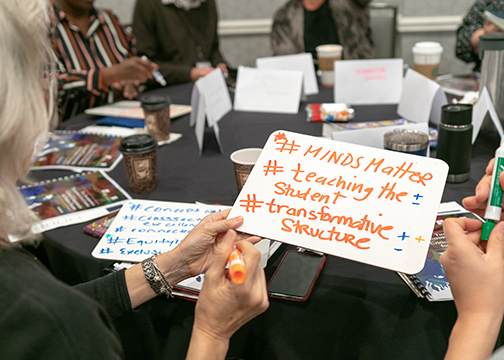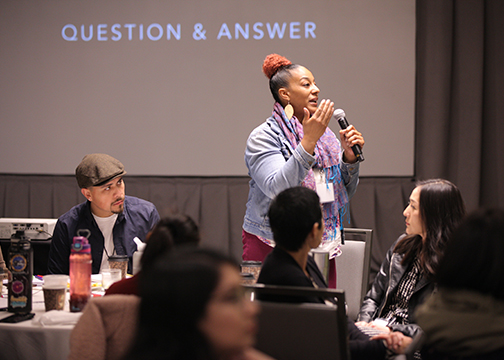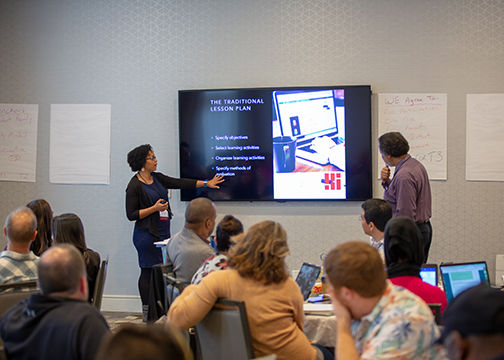Impact Report: Year-End 2020
Equity Institute at Skyline College
Equity is just and fair inclusion into a society in which all can participate, prosper, and reach their full potential.
Equity is providing support based on the context and needs of each individual.
Student equity is the center of our work.
Skyline College was founded during a decade that had started off as the dawn of a golden age. That same decade, the 1960s, ended as one of the most tumultuous and turbulent periods in America. Having been established in 1969, during the heart of the civil rights movement, educational equity has always been at the core of Skyline College’s mission.
The idea for an Equity Institute at Skyline College was borne out of a series of programs
that began in the Student Equity and Support Programs Division. Every spring semester,
a cohort of Skyline College employees participated in the division’s professional
development activities, this is an eight-week experience immersed together in a variety
of equity topics. These sessions moved participants to make meaningful and lasting
changes in the classroom and in other work environments, and were the inspiration
for the Institute with a broader, nation-wide reach. In 2018, Skyline College launched
the Equity Institute to transform the landscape of higher education by helping colleges
develop and sustain institutional approaches to equity and student success. 
Benefits of the Equity Institute’s programming and research extend to community colleges and educators nation-wide from varied institutions. The bi-annual Equity Summit, one of the Institute’s core programs, is held in the Fall Semester. The Summit is a one-day experience featuring Equity Talks and plenary sessions from 13 scholars and practitioners in social justice and equity. The event attracts over 500 educators and social justice advocates from across the nation.
Equity Academies, which take place quarterly, form another pillar of the Institute’s programming. These professional development opportunities invite educational leaders to immerse themselves in baseline concepts, interrogate data, and map implementation strategy to implement equity-centered work at participants’ respective institutions.
The Academies are guided by the T-3 framework, which encourages educators to look at their students and their experiences holistically. The T3 framework starts with the Traditional (T1) approach, reflects the current approach to classroom instruction, which is yielding us the equity gaps we’re currently experiencing within our institutions. Transitional (T2) approach, practices include modest modifications to the traditional lens; still this does not interrogate the root challenges that lead to inequitable outcomes. However, a Transformative (T3) consciousness and practice addresses historical and sociopolitical causes of inequities found in education and encourages educators to engage in data-informed efforts to repair and restore our educational systems. T3 also challenges and encourages educators to examine and improve their teaching methodologies to engender success for all students.
 Oyame KenZoe Brian Selassie-Okpe, who goes by O’KenZoe, was recently named as the
new Executive Director of the Equity Institute and member of the Skyline College senior
leadership team. When asked about his vision for the Institute, O’KenZoe’s reply illustrates
his inclusiveness, authenticity, and long history in the multicultural, equity, diversity,
and inclusion arenas. “I want to take the time to respect other people’s voices and
cultural worldview. I also want to honor the work of my team in the absence of an
Executive Director. Together, we will determine what the collective voices in our
entire community have in common, and we will come to a collective agreement of how
we move forward and do the work. The more inclusive and diverse we are, the more we
can foster a sense of belonging.” The vision is for the Equity Institute to eventually
expand and offer equity training services outside of the educational sector.
Oyame KenZoe Brian Selassie-Okpe, who goes by O’KenZoe, was recently named as the
new Executive Director of the Equity Institute and member of the Skyline College senior
leadership team. When asked about his vision for the Institute, O’KenZoe’s reply illustrates
his inclusiveness, authenticity, and long history in the multicultural, equity, diversity,
and inclusion arenas. “I want to take the time to respect other people’s voices and
cultural worldview. I also want to honor the work of my team in the absence of an
Executive Director. Together, we will determine what the collective voices in our
entire community have in common, and we will come to a collective agreement of how
we move forward and do the work. The more inclusive and diverse we are, the more we
can foster a sense of belonging.” The vision is for the Equity Institute to eventually
expand and offer equity training services outside of the educational sector.
O’KenZoe would like the Foundation community to know “contributions can be made in an array of beautiful ways, including financial support, program ideas, goodwill, and appreciation of the work through volunteerism. We want to create a welcoming space to make more substantive contributions.” The Foundation currently has a dedicated fund and donation page for the Equity Institute. With a background in grant writing, O’KenZoe is particularly keen to broaden the Institute’s collaboration with the Foundation. “The power of partnership can be so dynamic. The ability to make connections between the equity activism and having finances to execute the work in a way that is sustainable, is very important.”
Skyline College’s Equity Institute provides a unique opportunity for partnership and inclusiveness. The only entity of its kind in the community college system, the Equity Institute is also unique on the West Coast and in its comprehensiveness and timely in its design. “We have the opportunity to make the Institute even more special, in its inclusiveness and design.”
Read more Impact Report articles.
Download a pdf version of the Impact Report.
